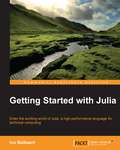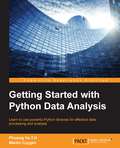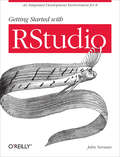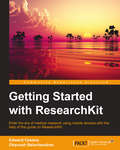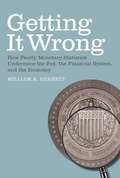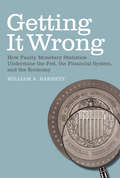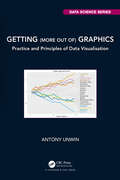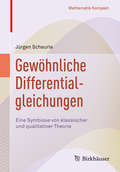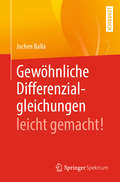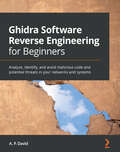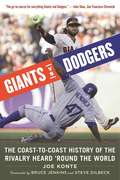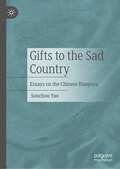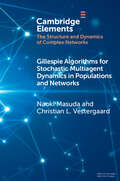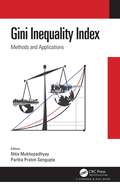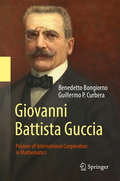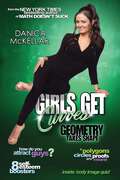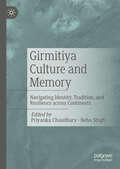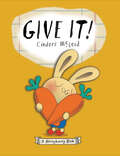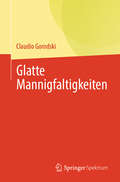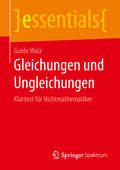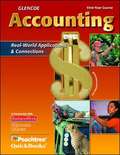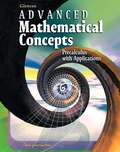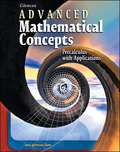- Table View
- List View
Getting Started with Julia Programming
by Ivo BalbaertThis book is for you if you are a data scientist or working on any technical or scientific computation projects. The book assumes you have a basic working knowledge of high-level dynamic languages such as MATLAB, R, Python, or Ruby.
Getting Started with Python Data Analysis
by Phuong VothihongIf you are a Python developer who wants to get started with data analysis and you need a quick introductory guide to the python data analysis libraries, then this book is for you.
Getting Started with RStudio: An Integrated Development Environment for R
by John VerzaniDive into the RStudio Integrated Development Environment (IDE) for using and programming R, the popular open source software for statistical computing and graphics. This concise book provides new and experienced users with an overview of RStudio, as well as hands-on instructions for analyzing data, generating reports, and developing R software packages.The open source RStudio IDE brings many powerful coding tools together into an intuitive, easy-to-learn interface. With this guide, you’ll learn how to use its main components—including the console, source code editor, and data viewer—through descriptions and case studies. Getting Started with RStudio serves as both a reference and introduction to this unique IDE.Use RStudio to provide enhanced support for interactive R sessionsClean and format raw data quickly with several RStudio componentsEdit R commands with RStudio’s code editor, and combine them into functionsEasily locate and use more than 3,000 add-on packages in R’s CRAN serviceDevelop and document your own R packages with the code editor and related componentsCreate one-click PDF reports in RStudio with a mix of text and R output
Getting Started with ResearchKit
by Dhanush Balachandran Edward CessnaEnter the era of medical research using mobile devices with the help of this guide on ResearchKit! About This Book * Create a simple clinical research app using most aspects of ResearchKit * Build a simple survey with various data types with the results printed on the screen. * A step-by-step guide introducing Apple's ResearchKit and techniques to incorporate it into various apps. Who This Book Is For This book is aimed at medical researchers with basic iOS coding knowledge and iOS developers looking to create clinical research apps. What You Will Learn * Learn to create customized consent form * Get introduced to two backend services: a simple backend server using Sinatra and Sage Bridge * Build a custom task (a conditional survey example) and a navigable task * Get an Overview of ResearchKit's open source repository and App Core * Interaction with the hardware of the device including the gyro and the motion sensors * Learn the basics of this revolutionary technology * Get introduced to the barebones app and learn to write your first code In Detail ResearchKit is an open source software development framework from Apple that lets you easily create mobile applications for clinical research studies. ResearchKit provides you the ability to orchestrate the administration of tasks and recording of the results. ResearchKit provides tasks in order to perform informed consent, active tasks, and surveys. Starting with the basics of the ResearchKit framework, this books walks you through the steps of creating iOS applications that could serve as the basis of a clinical research mobile app. This book will introduce readers to ResearchKit and how to turn your iPhone into into a clinical research tool. The book will start off by installing and building the research framework in line with the researcher's needs; during this, the reader will learn to embed ResearchKit in the application and create a small task. After this, the book will go a little deeper into creating modules for surveys, consents, and so on. The book will also cover the various aspects of privacy and security with regard to participant data, and how to build dashboards for visualizing medical data and results in line with the researcher's requirements: data backends, JSON serialization and deserialization, and so on. Readers will be able to fully utilize ResearchKit for medical research, will be able to get more and more patients to participate in their surveys, and will gain insights from the surveys using the dashboards created. Style and approach A hands-on guide with ample screenshots for you to follow and learn about ResearchKit. Each topic is explained sequentially and placed in context so that you can get a better understanding of every step in the process of creating clinical research apps.
Getting it Wrong: How Faulty Monetary Statistics Undermine the Fed, the Financial System, and the Economy
by William A. BarnettBlame for the recent financial crisis and subsequent recession has commonly been assigned to everyone from Wall Street firms to individual homeowners. It has been widely argued that the crisis and recession were caused by "greed" and the failure of mainstream economics. In Getting It Wrong, leading economist William Barnett argues instead that there was too little use of the relevant economics, especially from the literature on economic measurement. Barnett contends that as financial instruments became more complex, the simple-sum monetary aggregation formulas used by central banks, including the U. S. Federal Reserve, became obsolete. Instead, a major increase in public availability of best-practice data was needed. Households, firms, and governments, lacking the requisite information, incorrectly assessed systemic risk and significantly increased their leverage and risk-taking activities. Better financial data, Barnett argues, could have signaled the misperceptions and prevented the erroneous systemic-risk assessments. When extensive, best-practice information is not available from the central bank, increased regulation can constrain the adverse consequences of ill-informed decisions. Instead, there was deregulation. The result, Barnett argues, was a worst-case toxic mix: increasing complexity of financial instruments, inadequate and poor-quality data, and declining regulation. Following his accessible narrative of the deep causes of the crisis and the long history of private and public errors, Barnett provides technical appendixes, containing the mathematical analysis supporting his arguments.
Getting it Wrong: How Faulty Monetary Statistics Undermine the Fed, the Financial System, and the Economy
by William A. BarnettA leading economist contends that the recent financial crisis was caused not by the failure of mainstream economics but by corrupted monetary data constructed without reference to economics.Blame for the recent financial crisis and subsequent recession has commonly been assigned to everyone from Wall Street firms to individual homeowners. It has been widely argued that the crisis and recession were caused by “greed” and the failure of mainstream economics. In Getting It Wrong, leading economist William Barnett argues instead that there was too little use of the relevant economics, especially from the literature on economic measurement. Barnett contends that as financial instruments became more complex, the simple-sum monetary aggregation formulas used by central banks, including the U.S. Federal Reserve, became obsolete. Instead, a major increase in public availability of best-practice data was needed. Households, firms, and governments, lacking the requisite information, incorrectly assessed systemic risk and significantly increased their leverage and risk-taking activities. Better financial data, Barnett argues, could have signaled the misperceptions and prevented the erroneous systemic-risk assessments.When extensive, best-practice information is not available from the central bank, increased regulation can constrain the adverse consequences of ill-informed decisions. Instead, there was deregulation. The result, Barnett argues, was a worst-case toxic mix: increasing complexity of financial instruments, inadequate and poor-quality data, and declining regulation.Following his accessible narrative of the deep causes of the crisis and the long history of private and public errors, Barnett provides technical appendixes, containing the mathematical analysis supporting his arguments.
Getting: Practice and Principles of Data Visualisation (Chapman & Hall/CRC Data Science Series)
by Antony UnwinData graphics are used extensively to present information. Understanding graphics is a lot about understanding the data represented by the graphics, having a feel not just for the numbers themselves, the reliability and uncertainty associated with them, but also for what they mean. This book presents a practical approach to data visualisation with real applications front and centre.The first part of the book is a series of case studies, each describing a graphical analysis of a real dataset. The second part pulls together ideas from the case studies and provides an overview of the main factors affecting understanding graphics.Key Features: Explains how to get insights from graphics. Emphasises the value of drawing many graphics. Underlines the importance for analysis of background knowledge and context. Readers may be data scientists, statisticians or people who want to become more visually literate. A knowledge of Statistics is not required, just an interest in data graphics and some experience of working with data. It will help if the reader knows something of basic graphic forms such as barcharts, histograms, and scatterplots.
Gewöhnliche Differentialgleichungen
by Jürgen ScheurleDas vorliegende Lehrbuch enthält eine kompakte, in Vorlesungen erprobte Einführung in diese moderne Sichtweise der GDGn, wobei der klassische Stoff nicht vernachlässigt wird. Einerseits behandelt es auf mathematisch sehr gründliche Weise die wichtigsten analytischen Methoden und Resultate der klassischen Theorie für allgemeine Anfangswertprobleme, inklusive von Sätzen zur Existenz, Eindeutigkeit, stetigen bzw. glatten Abhängigkeit und Fortsetzung von Lösungen. Auch lineare Rand- und Eigenwertprobleme werden betrachtet. Andererseits werden geometrische Konzepte wie Phasenraum, Phasenfluss, Orbit, Äquivalenz und Stabilität eingeführt sowie ausführlich diskutiert. Es wird lediglich Vertrautheit mit dem an Universitäten in Grundvorlesungen gelehrten Stoff der Analysis und der Linearen Algebra vorausgesetzt. Die Anordnung des Stoffs ist so gewählt, dass das Lehrbuch in Vorlesungen unterschiedlicher mathematischer Tiefe im Rahmen von Bachelor- und Masterstudiengängen einsetzbar ist, wobei es insbesondere eine ideale Grundlage für weiterführende Lehrveranstaltungen über dynamische Systeme ist.
Gewöhnliche Differenzialgleichungen leicht gemacht!
by Jochen BallaDas vorliegende Buch bietet eine leicht lesbare Einführung in Theorie und Praxis gewöhnlicher Differenzialgleichungen. Es richtet sich an Studierende der Natur- und Ingenieurwissenschaften, der Wirtschaftswissenschaften und allgemein aller Fachgebiete, die Differenzialgleichungen benötigen. Auch Mathematikstudierende, die einen gut verständlichen Zugang suchen, werden angesprochen. Es werden gewöhnliche Differenzialgleichungen erster Ordnung, Differenzialgleichungssysteme, Differenzialgleichungen höherer Ordnung und lineare Differenzialgleichungen mit konstanten Koeffizienten behandelt. Auch ein Ausblick in partielle Differenzialgleichungen wird gegeben.Viele Beispiele und Übungsaufgaben ermutigen den Leser, sofort selbst „loszurechnen“, und Programmierbeispiele helfen dabei, Differenzialgleichungen auch numerisch zu bewältigen. Das Lehrbuch bietet verschiedene Hilfestellungen, die den Zugang erleichtern:Lesehilfen helfen über schwierige Stellen hinwegZwischenfragen mit Antworten regen zum Nachdenken anÜbungsaufgaben mit ausführlichen Lösungen motivieren zum praktischen Umgang mit Differenzialgleichungen„Das Wichtigste in Kürze“ fasst am Ende eines jeden Kapitels den Stoff zusammenEin Anhang bietet eine kurze Einführung in komplexe Zahlen Prof. Dr. rer. nat. Jochen Balla ist theoretischer Physiker. Seit 2004 unterrichtet er Mathematik für Ingenieure in verschiedenen Bachelor- und Master-Studiengängen der Hochschule Bochum.
Ghidra Software Reverse Engineering for Beginners: Analyze, identify, and avoid malicious code and potential threats in your networks and systems
by A. P. DavidDetect potentials bugs in your code or program and develop your own tools using the Ghidra reverse engineering framework developed by the NSA projectKey FeaturesMake the most of Ghidra on different platforms such as Linux, Windows, and macOSLeverage a variety of plug-ins and extensions to perform disassembly, assembly, decompilation, and scriptingDiscover how you can meet your cybersecurity needs by creating custom patches and toolsBook DescriptionGhidra, an open source software reverse engineering (SRE) framework created by the NSA research directorate, enables users to analyze compiled code on any platform, whether Linux, Windows, or macOS. This book is a starting point for developers interested in leveraging Ghidra to create patches and extend tool capabilities to meet their cybersecurity needs.You'll begin by installing Ghidra and exploring its features, and gradually learn how to automate reverse engineering tasks using Ghidra plug-ins. You'll then see how to set up an environment to perform malware analysis using Ghidra and how to use it in the headless mode. As you progress, you'll use Ghidra scripting to automate the task of identifying vulnerabilities in executable binaries. The book also covers advanced topics such as developing Ghidra plug-ins, developing your own GUI, incorporating new process architectures if needed, and contributing to the Ghidra project.By the end of this Ghidra book, you'll have developed the skills you need to harness the power of Ghidra for analyzing and avoiding potential vulnerabilities in code and networks.What you will learnGet to grips with using Ghidra's features, plug-ins, and extensionsUnderstand how you can contribute to GhidraFocus on reverse engineering malware and perform binary auditingAutomate reverse engineering tasks with Ghidra plug-insBecome well-versed with developing your own Ghidra extensions, scripts, and featuresAutomate the task of looking for vulnerabilities in executable binaries using Ghidra scriptingFind out how to use Ghidra in the headless modeWho this book is forThis SRE book is for developers, software engineers, or any IT professional with some understanding of cybersecurity essentials. Prior knowledge of Java or Python, along with experience in programming or developing applications, is required before getting started with this book.
Giants vs. Dodgers: The Coast-to-Coast History of the Rivalry Heard ?Round the World
by Steve Dilbeck Joe Konte Bruce JenkinsGames between the Dodgers and Giants are never just another day at the ballpark. Dating back to the late nineteenth century-when the teams embodied the competitive spirit of rival metropolises of New York and Brooklyn-the Giants-Dodgers rivalry gained intensity throughout the early twentieth century. The cheering and jeering continued unabated until 1957, when the clubs backed the moving vans up to the Polo Grounds and Ebbets Field, and took their rivalry to new venues in Los Angeles and San Francisco.Indeed, Brooklyn-New York baseball was a tough act to follow, but the West Coast version didn’t take long to fire up the emotions. Only six games into the first West Coast season, the clubs had their first beanball dustup. The venue had changed but the venom remained, and the rivalry became author Joe Konte’s obsession. Fifty-eight years ago, he attended one of the first Giants-Dodgers games ever played outside of New York. A longtime newspaper editor and baseball fiend, Konte understands what is so special about this storied rivalry. And so-via statistical analysis, game summaries, roster scrutiny, manager matchups, season recaps, and more-he has put together a rivalry bible. Revised and updated to include the events of the last three seasons-from the Giants’ 2014 World Series win and the Dodgers’ playoff runs-Giants vs. Dodgers captures the spirit and intensity of one of the greatest rivalries in American sports.
Gifts to the Sad Country: Essays on the Chinese Diaspora
by Souchou YaoThis book is a study of an ethnic-Chinese family in Malaysia as it struggled with the upheavals in China during the Land Reform (1945-1953) and the Great Leap Forward (1958-1962). Based on fieldwork in Malaysia and in a village in Dabu County, Southern China, it tells a story of a family whose existence straddled two nations, two political systems. Emigration is shown to be both a positive experience and a source of despair. The study redefines the conventional narrative about the Chinese diaspora as economically driven and politically expedient; mobility, personal freedom and transnational journeying were a part of their cultural history. The book highlights the fact that Chinese homeland, even under communist rule, offered the people a means of identification under difficult circumstances. During the time of radical reform, the diaspora adapted themselves to the conditions in the homeland, and for some China remained a place of longing and emotional attachment.
Gillespie Algorithms for Stochastic Multiagent Dynamics in Populations and Networks (Elements in Structure and Dynamics of Complex Networks)
by Naoki Masuda Christian L. VestergaardMany multiagent dynamics can be modeled as a stochastic process in which the agents in the system change their state over time in interaction with each other. The Gillespie algorithms are popular algorithms that exactly simulate such stochastic multiagent dynamics when each state change is driven by a discrete event, the dynamics is defined in continuous time, and the stochastic law of event occurrence is governed by independent Poisson processes. The first main part of this volume provides a tutorial on the Gillespie algorithms focusing on simulation of social multiagent dynamics occurring in populations and networks. The authors clarify why one should use the continuous-time models and the Gillespie algorithms in many cases, instead of easier-to-understand discrete-time models. The remainder of the Element reviews recent extensions of the Gillespie algorithms aiming to add more reality to the model (i.e., non-Poissonian cases) or to speed up the simulations. This title is also available as open access on Cambridge Core.
Gini Inequality Index: Methods and Applications
by Nitis Mukhopadhyay"Prof. Nitis Mukhopadhyay and Prof. Partha Pratim Sengupta, who edited this volume with great attention and rigor, have certainly carried out noteworthy activities." - Giovanni Maria Giorgi, University of Rome (Sapienza) "This book is an important contribution to the development of indices of disparity and dissatisfaction in the age of globalization and social strife." - Shelemyahu Zacks, SUNY-Binghamton "It will not be an overstatement when I say that the famous income inequality index or wealth inequality index, which is most widely accepted across the globe is named after Corrado Gini (1984-1965). ... I take this opportunity to heartily applaud the two co-editors for spending their valuable time and energy in putting together a wonderful collection of papers written by the acclaimed researchers on selected topics of interest today. I am very impressed, and I believe so will be its readers." - K.V. Mardia, University of Leeds Gini coefficient or Gini index was originally defined as a standardized measure of statistical dispersion intended to understand an income distribution. It has evolved into quantifying inequity in all kinds of distributions of wealth, gender parity, access to education and health services, environmental policies, and numerous other attributes of importance. Gini Inequality Index: Methods and Applications features original high-quality peer-reviewed chapters prepared by internationally acclaimed researchers. They provide innovative methodologies whether quantitative or qualitative, covering welfare economics, development economics, optimization/non-optimization, econometrics, air quality, statistical learning, inference, sample size determination, big data science, and some heuristics. Never before has such a wide dimension of leading research inspired by Gini's works and their applicability been collected in one edited volume. The volume also showcases modern approaches to the research of a number of very talented and upcoming younger contributors and collaborators. This feature will give readers a window with a distinct view of what emerging research in this field may entail in the near future.
Giovanni Battista Guccia: Pioneer of International Cooperation in Mathematics
by Benedetto Bongiorno Guillermo P. CurberaThis book examines the life and work of mathematician Giovanni Battista Guccia, founder of the Circolo Matematico di Palermo and its renowned journal, the Rendiconti del Circolo matematico di Palermo. The authors describe how Guccia, an Italian geometer, was able to establish a mathematical society in Sicily in the late nineteenth century, which by 1914 would grow to become the largest and most international in the world, with one of the most influential journals of the time. The book highlights the challenges faced by Guccia in creating an international society in isolated Palermo, and places Guccia’s activities in the wider European context through comparisons with the formation of the London Mathematical Society and the creation of Mittag-Leffler’s Acta Mathematica in Stockholm. Based on extensive searches in European archives, this scholarly work follows both historical and scientific treads, and will appeal to those interested in the history of mathematics and science in general.
Girls Get Curves: Geometry Takes Shape
by Danica McKellarNew York Times bestselling author Danica McKellar makes it a breeze to excel in high school geometry!Hollywood actress and math whiz Danica McKellar has completely shattered the &“math nerd&” stereotype. For years, she&’s been showing girls how to feel confident and ace their math classes—with style! With Girls Get Curves, she applies her winning techniques to high school geometry, giving readers the tools they need to feel great and totally &“get&” everything from congruent triangles to theorems, and more. Inside you&’ll find:• Time-saving tips and tricks for homework and tests• Illuminating practice problems (and proofs!) with detailed solutions• Totally relateable real-world examples• True stories from Danica&’s own life as an actress and math student• A Troubleshooting Guide, for getting unstuck during even the trickiest proofs!With Danica as a coach, girls everywhere can stop hiding from their homework and watch their scores rise!
Girmitiya Culture and Memory: Navigating Identity, Tradition, and Resilience across Continents
by Neha Singh Priyanka ChaudharyThis book explores the multifaceted dimensions of the Girmitya diaspora and post-memory. The intersections of dis/re-location and memory have always been a focus of scholarly interest and the volume envisages the roots of migration and culture, life stories, narratives, and personal anecdotes. It further accentuates Girmitiya struggles, politics of displacement, relationships with the homeland and host land, oral traditions, repercussions, and retention of the archival sites. The cross-examination of memories helps in building a framework to study the varied experiences of the Girmitiya community. In this volume, through a blend of historical and scholarly discourse, we embark on a journey to unearth the layers of meaning embedded within the Girmitya experience. The tales of Girmitya migration amplifies marginalized voices and illuminates the enduring resilience. By chronicling the experiences of the indentured migration, we pay homage to the pioneers, recognize the intricacy of their toils, and commemorate the continuing legacy.
Give It! (A Moneybunny Book)
by Cinders McLeodIn this delightful introduction to simple money concepts, an enthusiastic young bunny discovers how good it feels to use his allowance to help others.Chummy longs to be a superhero. He wants to save the world--or at least Bunnyland--from dragons, so spending his carrots on a superhero costume seems like a great plan! When his grandma reminds him that there aren't any dragons in Bunnyland, but that there are creatures that could use help, Chummy starts reconsidering the best way to spend his wad. This is the fourth book in the internationally acclaimed Moneybunny Books series that also includes Earn It!, Spend It!, and Save It!
Give Me Half!
by G. Brian Karas Stuart J. MurphyHow do you share a pizza? You split it in half! Two siblings split a yummy lunch and discover that using fractions can be messy. This hilarious book written by Stuart J. Murphy and illustrated by G. Brian Karas introduces the simplest of fractions: 1/2. This is a Level 2 MathStart book, which is perfect for kids ages 6 and up. The MathStart series uses funny stories and colorful art to show kids that they use math every day, even outside of the classroom! Each book features an activity guide to have fun with the math concepts presented in the story. Supports the Common Core Learning Standards
Glatte Mannigfaltigkeiten
by Claudio GorodskiDieses prägnante und praxisorientierte Lehrbuch präsentiert die Grundlagen der Mathematik auf glatten Mannigfaltigkeiten. Glatte Mannigfaltigkeiten sind ein Schlüsselkonzept in der Mathematik und weit verbreitet: Sie treten auf als Riemannsche Mannigfaltigkeiten in der Differentialgeometrie; als Raum-Zeiten in der Allgemeinen Relativitätstheorie; als Phasenräume und Energieniveaus in der Mechanik; als Definitionsbereiche von gewöhnlichen Differentialgleichungen in dynamischen Systemen; als Lie-Gruppen in Algebra und Geometrie; und in vielen anderen Bereichen.Das Buch präsentiert zunächst die grundlegenden Begriffe und Sätze zu glatten Mannigfaltigkeiten und kulminiert mit dem Frobenius-Theorem, bevor es Tensoren auf Mannigfaltigkeiten behandelt (einschließlich einer Darstellung der äußeren Ableitung von Differentialformen).Es behandelt dann Lie-Gruppen und Lie-Algebren und geht kurz auf homogene Mannigfaltigkeiten ein.Integration auf Mannigfaltigkeiten, Erläuterungen des Stokes-Theorems und der de-Rham-Kohomologie sowie Grundlagen der Differentialtopologie vervollständigen dieses Werk. Es enthält auch Übungen im gesamten Text, um den Lesern zu helfen, die Theorie zu verstehen, sowie anspruchsvollere Probleme für diejenigen, die Herausforderungen mögen, am Ende jedes Kapitels. Konzipiert für einen einsemestrigen Kurs über differentielle Mannigfaltigkeiten und Lie-Gruppen, der von vielen Graduiertenprogrammen weltweit angeboten wird, ist es eine wertvolle Ressource für Studierende und Dozenten gleichermaßen.Die Übersetzung wurde mit Hilfe von künstlicher Intelligenz durchgeführt. Eine anschließende menschliche Überarbeitung erfolgte vor allem in Bezug auf den Inhalt.
Gleichungen und Ungleichungen: Klartext Für Nichtmathematiker (Essentials)
by Guido WalzDas Buch vermittelt in leicht verständlicher Sprache die Grundlagen des Lösens von Gleichungen und Ungleichungen. Eines der Hauptthemen ist das Lösen von quadratischen Gleichungen, unabhängig davon, ob sie bereits in Normalform vorliegen oder erst in diese gebracht werden müssen. Als Instrument hierfür behandelt der Autor die p-q-Formel und die Mitternachtsformel. Daneben geht es um lineare Gleichungen sowie ganz allgemein um die Frage, welche Manipulationen man an einer Gleichung vornehmen darf, ohne ihre Lösungen zu ändern. Weiterhin werden die wichtigsten Ungleichungen behandelt und Strategien zu ihrer Lösung aufgezeigt.Der Autor Dr. Guido Walz ist Professor für Angewandte Mathematik an der Wilhelm-Büchner-Hochschule Darmstadt und Dozent an der Dualen Hochschule Baden-Württemberg, Herausgeber des fünfbändigen „Lexikon der Mathematik“ sowie Autor zahlreicher Fachveröffentlichungen und Lehrbücher, z.B. „Mathematik für Fachhochschule und duales Studium“.
Glencoe Accounting: Real-world Applications and Connections
by Robert Turner Donald Guerrieri F. Haber William HoytGlencoe Accounting: Real World Applications and Connections - First Year Course is the only accounting program with Peachtree fully integrated throughout. Glencoe is the only publisher to use real-world accounting software and companies to teach accounting!
Glencoe Advanced Mathematical Concepts Precalculus with Applications
by Berchie Holliday Gilbert J. Cuevas John A. Carter Melissa S. Mcclure Daniel MarksAdvanced Mathematical Concepts provides comprehensive coverage of all the topics covered in a full-year Precalculus course. Its unit organization readily allows for semester courses in Trigonometry, Discrete Mathematics, Analytic Geometry, and Algebra and Elementary Functions.
Glencoe Advanced Mathematical Concepts, Precalculus with Applications [Grade 11]
by Berchie Holliday Gilbert J. Cuevas Melissa S. Mcclure"Advanced Mathematical Concepts, (c)2006 provides comprehensive coverage of all the topics covered in a full-year Precalculus course. Its unique unit organization readily allows for semester courses in Trigonometry, Discrete Mathematics, Analytic Geometry, and Algebra and Elementary Functions. Pacing and Chapter Charts for Semester Courses are conveniently located on page T4 of the Teacher Wraparound Edition. <BR>"Advanced Mathematical Concepts lessons develop mathematics using numerous examples, real-world applications, and an engaging narrative. Graphs, diagrams, and illustrations are used throughout to help students visualize concepts. Directions clearly indicate which problems may require the use of a graphing calculator.
Glencoe Advanced Mathematical Concepts, Precalculus with Applications [Grade 11]
by Berchie Holliday Gilbert J. Cuevas Melissa S. McclureAdvanced Mathematical Concepts, ©2006 provides comprehensive coverage of all the topics covered in a full-year Precalculus course. Its unique unit organization readily allows for semester courses in Trigonometry, Discrete Mathematics, Analytic Geometry, and Algebra and Elementary Functions. Pacing and Chapter Charts for Semester Courses are conveniently located in the Teacher Wraparound Edition. Advanced Mathematical Conceptslessons develop mathematics using numerous examples, real-world applications, and an engaging narrative. Graphs, diagrams, and illustrations are used throughout to help students visualize concepts. Directions clearly indicate which problems may require the use of a graphing calculator.
